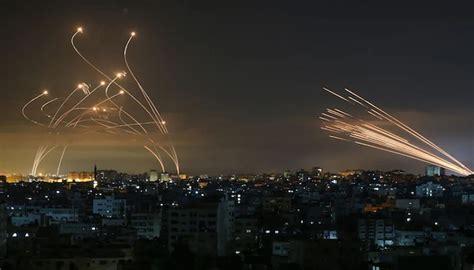
Iran launches missile attack on Israel
Iran launched a barrage of missiles at Israel on Tuesday, shortly after the U.S. warned an attack was imminent. The attack appeared to be over within an hour of starting.
White House national security adviser Jake Sullivan told reporters Tuesday afternoon that the attack “appears to have been defeated and ineffective.”
“We are still working with the IDF and the authorities in Israel to assess the impact of the attack,” he said. “But at this time, and I stress at this time, we do not know of any deaths in Israel. … We do not know of any damage to aircraft or strategic military assets in Israel.”
Sullivan said U.S. naval destroyer ships assisted Israeli air defense systems in shooting down the missiles. He called the Iranian attack a “significant escalation.”
He also stressed that the situation was fluid, and the damage assessment could change. Sullivan noted it was an ongoing security situation and there were discussions about a response.
“We will consult with the Israelis on next steps in terms of the response,” he said, and “how to deal with what Iran has just done. We will continue to monitor for further threats and attacks from Iran and its proxies.”
Israeli military spokesperson Rear Adm. Daniel Hagari said around 7:30 p.m. local time in Israel that missiles had just been launched from Iran. Sirens have been sounded across Israel, according to the military.
The Iranian mission to the UN indicated on X shortly after 8 p.m. that it had finished.
“Iran’s legal, rational, and legitimate response to the terrorist acts of the Zionist regime—which involved targeting Iranian nationals and interests and infringing upon the national sovereignty of the Islamic Republic of Iran—has been duly carried out,” according to the post, which warned that any “further acts of malevolence” from Israel would warrant “a subsequent and crushing response.”
The IDF also confirmed the end of the barrage in a post that told Israeli citizens it was safe to leave their shelters.
Ahead of the attack, Israeli civilians were told to remain vigilant and follow orders from authorities, who sent messages to phones and directed people to safe zones.
Hagari said air defense systems are fully operational and ready to intercept any missiles.
“The IDF is doing and will continue to do everything necessary to protect the civilians of Israel,” he said, referring to Israel’s military. “The IDF is fully prepared for both defense and offense at peak readiness.”
A White House senior official warned earlier Tuesday morning that Iran was preparing an imminent attack, coming just hours after Israel began raids into southern Lebanon targeting the Iranian-backed militant group Hezbollah.
U.S. Defense Secretary Lloyd Austin also spoke with Israeli Minister of Defense Yoav Gallant earlier Tuesday, when the two discussed the “imminent” threat of an Iranian attack against Israel.
“Secretary Austin made it clear that the United States is well-postured to defend U.S. personnel, allies, and partners in the face of threats from Iran and Iran-backed terrorist organizations and is determined to prevent any actor from exploiting tensions or expanding the conflict in the region,” according to a readout of the call from Pentagon press secretary Maj. Gen. Patrick Ryder.
The two also “discussed the severe consequences for Iran in the event Iran chooses to launch a direct military attack against Israel.”
Former President Trump quickly commented on the attacks Tuesday afternoon.
“Look at the World today — Look at the missiles flying right now in the Middle East, look at what’s happening with Russia/Ukraine, look at Inflation destroying the World. NONE OF THIS HAPPENED WHILE I WAS PRESIDENT!” he wrote in a social media post.
The Iranian blitz comes after a bruising and nearly yearlong cross-border conflict between Hezbollah, a star proxy group for Tehran, and Israeli forces. The fight, tied to the ongoing war in Gaza, has severely crippled Hezbollah after Israel eliminated most of its command structure in the past month.
Israel killed Hezbollah leader Hassan Nasrallah and several other high-ranking officials in a strike in Beirut on Friday. And earlier in September, it was reported to be behind the detonation of pagers and walkie-talkies used by rank-and-file members of the Iranian proxy. Ongoing massive Israeli strikes also have killed more than a thousand people in Lebanon, according to local officials.
Iran’s response is not a surprise, as its Supreme Leader Seyyed Ali Hosseini Khamenei said on Saturday that attacks against Israel “will become even more crushing.”
And the U.S., in anticipation of further conflict, had positioned a slew of assets in the Middle East, including an aircraft carrier strike group, a guided-missile submarine, additional Navy ships and fighter jets. On Monday, the Pentagon announced it was sending even more troops and aircraft to the region.
Tehran last launched major strikes against Israel in April, sending roughly 300 drones and missiles at the country in an assault that was largely shot down by Israeli defense systems, with the help of the U.S. and allies in the region.
The Iranian attack also quickly brought on responses from U.S. lawmakers, including Sen. Lindsey Graham (R-S.C.), who pressed the Biden administration to respond.
“This missile attack against Israel should be the breaking point and I would urge the Biden Administration to coordinate an overwhelming response with Israel, starting with Iran’s ability to refine oil,” Graham said in a statement.
He suggested that Iranian oil refineries “need to be hit and hit hard because that is the source of cash for the regime to perpetrate their terror.”
Source » msn.com





